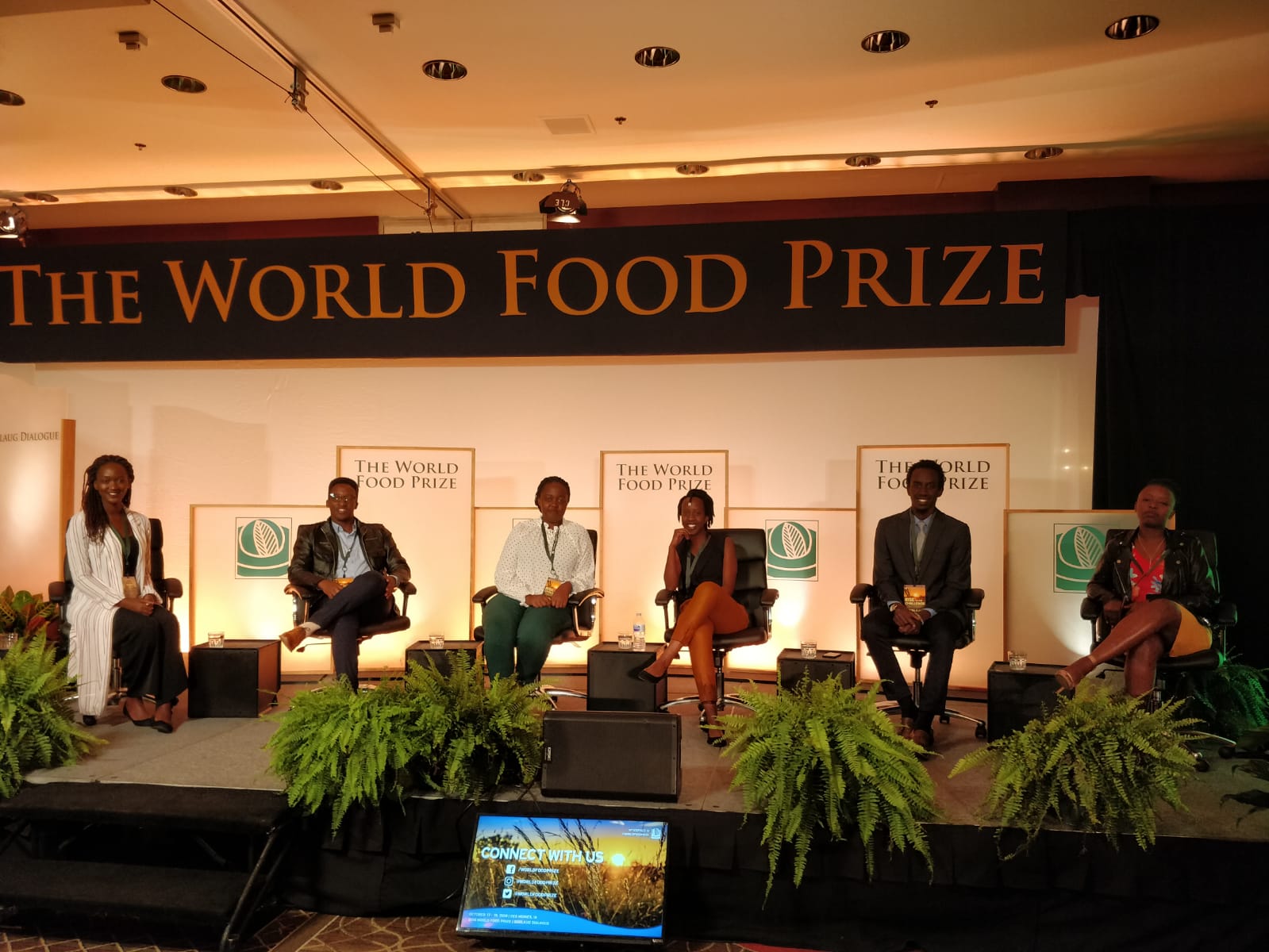
Seven undergraduate students from the College of Agriculture and Natural Resources, as well as a visiting international scholar with the Borlaug Fellowship program and her faculty mentor, attended this year’s World Food Prize Norman E. Borlaug International Symposium, or “Borlaug Dialogue” in Des Moines, Iowa.
Named for famed agronomist, Nobel Peace Prize laureate and “Father of the Green Revolution,” Norman Borlaug, the symposium convenes an array of international leaders, farmers, agribusiness professionals, non-governmental organizations, and development experts. Called by some "the premier conference in the world on global agriculture,” this year’s theme was “Rise to the Challenge,” and explored the massive cross-sector effort to feed the planet’s future population of 9.5 billion people expected by 2050.
“It was my first time to know we are not alone… (that) many people put their heart into developing global agriculture,” said senior food science and technology major Yue Yan. Yan is a student in the inaugural cohort of the joint 3+1 Program Nebraska operates with Northwest Agriculture and Forestry University in China. She attended the conference as part of her involvement with the IANR Student Diplomat program.
“It’s also my first time to know we still have far to go, not only for the person who already has achieved success, but for us students, to try our best to apply what we have learned,” she said.
In the course of addressing the “Rise to the Challenge” theme, the symposium covered an array of topics, including: the foremost pest threat to global food security, the fall armyworm; the regulatory challenges and opportunities of CRISPR; the interconnections of hunger, conflict and peace; digital innovation in Indian agriculture; building better food systems for biodiversity; and the world of agribusiness and entrepreneurship—with a spotlight on financial institutions and capital investment in agriculture.
Part of the symposium each year is the awarding of the World Food Prize, the foremost international honor recognizing the achievements of individuals who have advanced human development by improving the quality, quantity or availability of food in the world. This year’s laureates were Dr. Lawrence Haddad and Dr. David Nabarro, named for their individual and complementary global leadership in elevating maternal and child undernutrition to a central issue within the food security and development dialogue. For more on the 2018 Laureates, see the World Food Prize website.
“The Borlaug Dialogue helped me decide on my minor,” said Shemsa Ndahiro Iribagiza, a sophomore integrated science major and Rwandan CUSP Scholar who also attended the event as an IANR Student Diplomat. “I can surely say that nutrition is the best thing that will help me give back to my community back in Rwanda.”
The World Food Prize organization has an impressive international reach. Internship programs in 23 countries operate out of leading research institutions like the International Maize and Wheat Improvement Center (CIMMYT) in Mexico, the International Livestock Research Institute (ILRI) in Ethiopia, and the Center for International Forestry Research (CIFOR) in Indonesia. A council of advisors hailing from 15 countries, and current and former laureates from nearly 20 countries are also active in the World Food Prize. Thus, the Borlaug Dialogue attracts attendees from a wide array of organizations and industries; it’s an excellent opportunity for students, both domestic and international, to engage with food security leaders from all over the world.
“Meeting Sir Gordon Conway and hearing first-hand about his long-time commitment to develop efficient, highly productive agriculture in the most vulnerable places in the world, not just in terms of philanthropy, but also going to the field, getting his hands dirty and working with farmers—it was highly inspirational,” said Gislain Ntwali Muikira, a junior integrated science major and Rwandan CUSP Scholar who attended the symposium as one of the winners of the CUSP Research Expo poster contest held in Kigali, Rwanda this August.
In addition to being such an opportunity for students, attending the event is also a specific part of the USDA Foreign Ag Service’s Borlaug International Agricultural Science and Technology Fellowship Program, of which Nebraska is currently hosting fellow Shinekhuu Jugder of Mongolia. The program promotes food security and economic growth by providing training and collaborative research opportunities to fellows, usually early to mid-career scientists, from developing and middle-income countries. The IANR Office of Global Engagement has coordinated hosting these scholars and matching them with faculty mentors since 2015.
“This event helped me to consider again… what we should do to create a sustainable and safe food supply for our future,” said Jugder. “(Something that) really inspired me was a citation on the wall (which read), ‘Food is the moral right of all who are born into this word.’”
Each year, attendees leave the conference with new connections, new ideas and a refreshed sense of purpose in their studies and work.
“It’s so important for students to attend events like this, because not only do you get inspired to work even harder…but also you get to relate what you study in class with what the world needs and how you can be a pioneer in solving different problems and make a long lasting impact,” said Ntwali Muhikira.
To view the original article, please visit the IANR Global Engagement website.